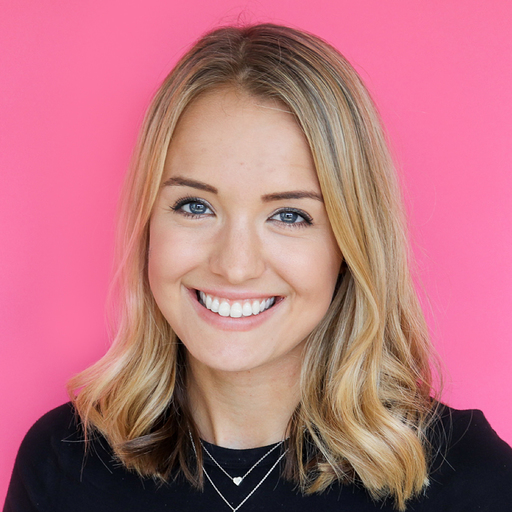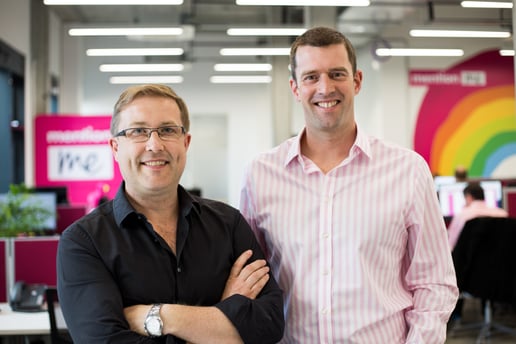Q&A with Mention Me's co-founders

Andy Cockburn and Tim Boughton reveal their inspiration for Mention Me, how things have changed, and their plans for the future.
Did you always plan to start a business?
Tim: Yes. I’ve always preferred to create things from scratch, that’s one of the reasons I became an engineer. I started my first business when I was 12, made £104 in a month and caught the bug. But it wasn’t until much later, around 1999, that I got my first taste of building a startup from scratch after working as a consultant on a start-up project.
Andy: I started my first business back in 2006. After winning a business plan competition whilst studying for an MBA at INSEAD, I emailed my class to see if anyone wanted to invest in the idea. On the back of that email I raised £170,000 investment! That got me going on the startup journey. Ever since, I’ve been hooked on the rollercoaster ride of entrepreneurship. I met Tim in 2010 while working at HomeAway, we started discussing business ideas, and the rest is history.
What inspired you to start Mention Me?
Tim: Andy and I knew we wanted to start a business together, but we didn’t know what business that would be. We took a systematic approach, meeting weekly at the pub to brainstorm ideas. It wasn’t long before we had a spreadsheet with 300 ideas in it. About 10 weeks in, we started seriously thinking about referral marketing. We threw the spreadsheet away after that.
Andy: We knew from our experiences at HomeAway that referral was the best possible way to find new customers and grow, but that it was incredibly difficult to do at scale. We became obsessed with the idea of referral. We felt that if we could develop a solution that solved for the social psychology around it, then we could empower clients to open up the referral marketing channel. Once we started getting positive feedback from early clients, like Glasses Direct and LoveCrafts (who remain clients to this day), we knew we were on to something.
What were the early days like?
Tim: My overriding memory of those days was that there was always so much to do. One way we took on that challenge was by setting ourselves nine tests (based on The Lean Startup by Eric Ries). We knew that if we could pass all nine, ranging from client perception of value to product potential and business economics, we had a business that could work. Everything we did was focussed on trying to answer these tests.
Andy: The early days were hard work but incredibly satisfying. For two years, it was just the two of us doing every role there is. I can tell you that doing QA (quality assurance) is not one of my strengths...
Tim: And I’m not a natural salesman!
Andy: But it was a great learning experience. We were so involved in every part of the business - I once ran out of a wedding ceremony to call Tim after seeing we’d processed 15 referrals in a morning. We now deliver that many every three minutes!
How do the early days compare to today? What's your typical day like now?
Andy: Things are very different now. The founder role is constantly evolving. I see our current job as hiring the right people and empowering them to do a better job than we ever could.
Tim: In the early years, we were working in the business; now we’re working on the business. We want to put in place the right systems, structures and processes to create momentum that will see it grow long into the future.
My typical day involves working with the engineering team to solve problems, set direction, and make sure we’re on track to be where we want in six months and beyond.
Andy: I have a rough rule of thumb that I should be spending 60% of my time working with our teams on longer term priorities, 20% reacting to events as they happen, and 20% talking to clients and understanding how the market is changing.
What was the turning point for Mention Me?
Andy: There’s been a couple of turning points. The first was passing the nine tests we set ourselves after two years, when we decided we were ready to hire others and grow the business. That’s when it stopped feeling like a project and started feeling like a business.
Tim: Another turning point was raising venture capital in 2018. We’ve since launched our second product, Mention Me Retain, worked with international clients, and grown to a team of 70 people.
What's your biggest achievement so far?
Andy: Bringing together a team of talented people driven by a strong culture. Navigating the uncertainty created by the Coronavirus has brought out the best in our team and shown how strong we really are. It makes me feel very proud.
Tim: We’ve carved a niche in the martech landscape and built a trusted brand from scratch. That feels like a real achievement to be proud of.
What are your biggest strengths and weaknesses as entrepreneurs?
Tim: We like to think our skill-sets complement one another. Andy’s strength is his drive to lead the company and unite people in our vision. He’s the reason we have such a strong company culture. His weakness is the flip side of that; it can make it tough to make decisions that not everyone agrees with.
Andy: Tim’s strength is his ability to understand both the technical and the commercial side of things. He has such a strong understanding of the business and our clients that he’s able to make the right decisions about what we should build and how we should build it. Tim’s challenge is getting out of the weeds and spending time on the bigger picture.
What one thing would you attribute to your success?
Tim: People. We were super careful about our first few hires and that set the foundations for Mention Me today. Now our focus is on hiring more great people and creating an environment where they can thrive.
Andy: It’s also about building positive relationships. Treat people as you’d like to be treated, whether they’re clients, employees, or anyone else. That’s how we have grown. Gaining our clients’ trust continues to be incredibly important to us.
Why is supporting entrepreneurs important to you?
Tim: We’re both part of entrepreneurial networks which are great for giving and getting support. When you’re just starting out, any advice or help you can get from others is really important. I want to support a culture of innovation.
Andy: The start-up network is one of the most incredible parts of being an entrepreneur. I benefited hugely from people helping me out when I started my first venture and want to do the same for others. Helping early stage entrepreneurs is fun; you get to relive your own early enthusiasm while sharing ideas and practical advice.
What are your plans for the future?
Andy: We’re on a mission to revolutionise marketing with a concept we call Customer-Led Growth: engaging with existing customers to fuel long-term, sustainable business growth. My personal ambitions always come back to people. When I look back on life, I’ll be most proud of working with a team of brilliant people doing great things. I want to continue delivering on that.
Tim: We’ve achieved a lot but there’s still so much to do. There’s always the next stage to look forward to. I like to think we’ve got a good foundation but we’re just getting started.
This interview originally featured in the Great British Entrepreneur magazine. Read the full article here (p.70-1).

Sophia King
Read more >.png)
Never miss another update
Subscribe to our blog and get monthly emails packed full of the latest marketing trends and tips








